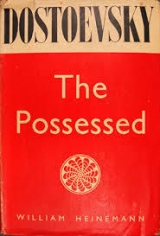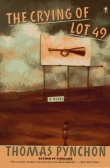
Текст книги "The Possessed"
Автор книги: Федор Достоевский
сообщить о нарушении
Текущая страница: 11 (всего у книги 49 страниц)
“Why, had you one?” And Shatov, who had been listening attentively all the time, nudged me with his elbow.
“Why, of course. A little rosy baby with tiny little nails, and my only grief is I can't remember whether it was a boy or a girl. Sometimes I remember it was a boy, and sometimes it was a girl. And when he was born, I wrapped him in cambric and lace, and put pink ribbons on him, strewed him with flowers, got him ready, said prayers over him. I took him away un-christened and carried him through the forest, and I was afraid of the forest, and I was frightened, and what I weep for most is that I had a baby and I never had a husband.”
“Perhaps you had one?” Shatov queried cautiously.”
“You're absurd, Shatushka, with your reflections. I had, perhaps I had, but what's the use of my having had one, if it's just the same as though I hadn't. There's an easy riddle for you. Guess it!” she laughed.
“Where did you take your baby?”
“I took it to the pond,” she said with a sigh.
Shatov nudged me again.
“And what if you never had a baby and all this is only a wild dream?”
“You ask me a hard question, Shatushka,” she answered dreamily, without a trace of surprise at such a question. “I can't tell you anything about that, perhaps I hadn't; I think that's only your curiosity. I shan't leave off crying for him anyway, I couldn't have dreamt it.” And big tears glittered in her eyes. “Shatushka, Shatushka, is it true that your wife ran away from you?”
She suddenly put both hands on his shoulders, and looked at him pityingly. “Don't be angry, I feel sick myself. Do you know, Shatushka, I've had a dream: he came to me again, he beckoned me, called me. 'My little puss,' he cried to me, 'little puss, come to me!' And I was more delighted at that 'little puss' than anything; he loves me, I thought.”
“Perhaps he will come in reality,” Shatov muttered in an undertone.
“No, Shatushka, that's a dream. . . . He can't come in reality. You know the song:
' A new fine house I do not crave,
This tiny cell's enough for me;
There will I dwell my soul to save
And ever pray to God for thee.'
Ach, Shatushka, Shatushka, my dear, why do you never ask
me about anything?”
“Why, you won't tell. That's why I don't ask.”
“I won't tell, I won't tell,” she answered quickly. “You may kill me, I won't tell. You may burn me, I won't tell.
And whatever I had to bear I'd never tell, people won't find out!”
“There, you see. Every one has something of their own,” Shatov said, still more softly, his head drooping lower and lower.
“But if you were to ask perhaps I should tell, perhaps I should!” she repeated ecstatically. “Why don't you ask I Ask, ask me nicely, Shatushka, perhaps I shall tell you. Entreat me, Shatushka, so that I shall consent of myself. Shatushka, Shatushka!”
But Shatushka was silent. There was complete silence lasting a minute. Tears slowly trickled down her painted cheeks. She sat forgetting her two hands on Shatov's shoulders, but no longer looking at him.
“Ach, what is it to do with me, and it's a sin.” Shatov suddenly got up from the bench.
“Get up!” He angrily pulled the bench from under me and put it back where it stood before.
“He'll be coming, so we must mind he doesn't guess. It's time we were off.”
“Ach, you're talking of my footman,” Marya Timofyevna laughed suddenly. “You're afraid of him. Well, good-bye, dear visitors, but listen for one minute, I've something to tell you. That Nilitch came here with Filipov, the landlord, a red beard, and my fellow had flown at me just then, so the landlord caught hold of him and pulled him about the room while he shouted 'It's not my fault, I'm suffering for another man's sin!' So would you believe it, we all burst out laughing. . . .”
“Ach, Timofyevna, why it was I, not the red beard, it was I pulled him away from you by his hair, this morning; the landlord came the day before yesterday to make a row; you've mixed it up.”
“Stay, I really have mixed it up. Perhaps it was you. Why dispute about trifles? What does it matter to him who it is gives him a beating?” She laughed.
“Come along!” Shatov pulled me. “The gate's creaking, he'll find us and beat her.”
And before we had time to run out on to the stairs we heard a drunken shout and a shower of oaths at the gate.
Shatov let me into his room and locked the door.
“You'll have to stay a minute if you don't want a scene. He's squealing like a little pig, he must have stumbled over the gate again. He falls flat every time.”
We didn't get off without a scene, however.
VI
Shatov stood at the closed door of his room and listened; suddenly he sprang back.
“He's coming here, I knew he would,” he whispered furiously. “Now there'll be no getting rid of him till midnight.”
Several violent thumps of a fist on the door followed.
“Shatov, Shatov, friend. . . .! open!” yelled the captain. “Shatov,
‘I have come, to thee to tell thee
That the sun doth r-r-rise apace,
That the forest glows and tr-r-rembles
In . . . the fire of . . . his . . . embrace.
Tell thee I have waked, God damn thee,
Wakened under the birch-twigs. . . .’
(“As it might be under the birch-rods, ha ha!”)
‘Silvery little bird . . . is . . . thirsty,
Says I’m going
to . . . have a drink,
But I don’t . . . know what to drink. . . .’
Damn his stupid curiosity! Shatov, do you understand how good it is to be alive!”
“Don't answer!” Shatov whispered to me again.
“Open the door! Do you understand that there's something higher than brawling ... in mankind; there are moments of an hon-hon-honourable man. . . . Shatov, I'm good; I'll forgive you. . . . Shatov, damn the manifestoes, eh?”
Silence.
“Do you understand, you ass, that I'm in love, that I've bought a dress-coat, look, the garb of love, fifteen roubles; a captain's love calls for the niceties of style. . . . Open the door!” he roared savagely all of a sudden, and he began furiously banging with his fists again.
“Go to hell!” Shatov roared suddenly. .
“S-s-slave! Bond-slave, and your sister's a slave, a bondswoman . . . a th . . . th . . . ief!”
“And you sold your sister.”
“That's a lie! I put up with the libel though. I could with one word ... do you understand what she is?”
“What?” Shatov at once drew near the door inquisitively.
“But will you understand?”
“Yes, I shall understand, tell me what?”
“I'm not afraid to say! I'm never afraid to say anything in public! . . .”
“You not afraid? A likely story,” said Shatov, taunting him, and nodding to me to listen.
“Me afraid?”
“Yes, I think you are.”
“Me afraid?”
“Well then, tell away if you're not afraid of your master's whip. . . . You're a coward, though you are a captain!”
“I ... I ... she's . . . she's . . .” faltered Lebyadkin in a voice shaking with excitement.
“Well?” Shatov put his ear to the door.
A silence followed, lasting at least half a minute.
“Sc-ou-oundrel!” came from the other side of the door at last, and the captain hurriedly beat a retreat downstairs, puffing like a samovar, stumbling on every step.
“Yes, he's a sly one, and won't give himself away even when he's drunk.”
Shatov moved away from the door.
“What's it all about?” I asked.
Shatov waved aside the question, opened the door and began listening on the stairs again. He listened a long while, and even stealthily descended a few steps. At last he came back.
“There's nothing to be heard; he isn't beating her; he must have flopped down at once to go to sleep. It's time for you to go.”
“Listen, Shatov, what am I to gather from all this?”
“Oh, gather what you like!” he answered in a weary and disgusted voice, and he sat down to his writing-table.
I went away. An improbable idea was growing stronger and stronger in my mind. I thought of the next day with distress. . . .
VII
This “next day,” the very Sunday which was to decide Stepan Trofimovitch's fate irrevocably, was one of the most memorable days in my chronicle. It was a day of surprises, a, day that solved past riddles and suggested new ones, a day of startling revelations, and still more hopeless perplexity. In the morning, as the reader is already aware, I had by Varvara, Petrovna's particular request to accompany my friend on his visit to her, and at three o'clock in the afternoon I had to be with Lizaveta Nikolaevna in order to tell her – I did not know what – and to assist her – I did not know how. And meanwhile it all ended as no one could have expected. In a word, it was a day of wonderful coincidences.
To begin with, when Stepan Trofimovitch and I arrived at Varvara Petrovna's at twelve o'clock punctually, the time she had fixed, we did not find her at home; she had not yet come back from church. My poor friend was so disposed, or, more accurately speaking, so indisposed that this circumstance crushed him at once; he sank almost helpless into an arm-chair in the drawing-room. I suggested a glass of water; but in spite of his pallor and the trembling of his hands, he refused it with dignity. His get-up for the occasion was, by the way, extremely recherche: a shirt of batiste and embroidered, almost fit for a ball, a white tie, a new hat in his hand, new straw-coloured gloves, and even a suspicion of scent. We had hardly sat down when Shatov was shown in by the butler, obviously also by official invitation. Stepan Trofimovitch was rising to shake hands with him, but Shatov, after looking attentively at us both, turned away into a corner, and sat down there without even nodding to us. Stepan Trofimovitch looked at me in dismay again.
We sat like this for some minutes longer in complete silence. Stepan Trofimovitch suddenly began whispering something to me very quickly, but I could not catch it; and indeed, he was so agitated himself that he broke off without finishing. The butler came in once more, ostensibly to set something straight on the table, more probably to take a look at us.
Shatov suddenly addressed him with a loud question:
“Alexey Yegorytch, do you know whether Darya Pavlovna has gone with her?”
“Varvara Petrovna was pleased to drive to the cathedral alone, and Darya Pavlovna was pleased to remain in her room upstairs, being indisposed,” Alexey Yegorytch announced formally and reprovingly.
My poor friend again stole a hurried and agitated glance at me, so that at last I turned away from him. Suddenly a carriage rumbled at the entrance, and some commotion at a distance in the house made us aware of the lady's return. We all leapt up from our easy chairs, but again a surprise awaited us; we heard the noise of many footsteps, so our hostess must have returned not alone, and this certainly was rather strange, since she had fixed that time herself. Finally, we heard some one come in with strange rapidity as though running, in a way that Varvara Petrovna could not have come in. And, all at once she almost flew into the room, panting and extremely agitated. After her a little later and much more quickly Lizaveta Nikolaevna came in, and with her, hand in hand, Marya Timofyevna Lebyadkin! If I had seen this in my dreams, even then I should not have believed it.
To explain their utterly unexpected appearance, I must go back an hour and describe more in detail an extraordinary adventure which had befallen Varvara Petrovna in church.
In the first place almost the whole town, that is, of course, all of the upper stratum of society, were assembled in the cathedral. It was known that the governor's wife was to make her appearance there for the first time since her arrival amongst us. I must mention that there were already rumours that she was a free-thinker, and a follower of “the new principles.” All the ladies were also aware that she would be dressed with magnificence and extraordinary elegance. And so the costumes of our ladies were elaborate and gorgeous for the occasion.
Only Varvara Petrovna was modestly dressed in black as she always was, and had been for the last four years. She had taken her usual place in church in the first row on the left, and a footman in livery had put down a velvet cushion for her to kneel on; everything in fact, had been as usual. But it was noticed, too, that all through the service she prayed with extreme fervour. It was even asserted afterwards when people recalled it, that she had had tears in her eyes. The service was over at last, and our chief priest, Father Pavel, came out to deliver a solemn sermon. We liked his sermons and thought very highly of them. We used even to try to persuade him to print them, but he never could make up his mind to. On this occasion the sermon was a particularly long one.
And behold, during the sermon a lady drove up to the church in an old fashioned hired droshky, that is, one in which the lady could only sit sideways, holding on to the driver's sash, shaking at every jolt like a blade of grass in the breeze. Such droshkys are still to be seen in our town. Stopping at the corner of the cathedral – for there were a number of carriages, and mounted police too, at the gates – the lady sprang out of the droshky and handed the driver four kopecks in silver.
“Isn't it enough, Vanya?” she cried, seeing his grimace. “It's all I've got,” she added plaintively.
“Well, there, bless you. I took you without fixing the price,” said the driver with a hopeless gesture, and looking at her he added as though reflecting:
“And it would be a sin to take advantage of you too.”
Then, thrusting his leather purse into his bosom, he touched up his horse and drove off, followed by the jeers of the drivers standing near. Jeers, and wonder too, followed the lady as she made her way to the cathedral gates, between the carriages and the footmen waiting for their masters to come out. And indeed, there certainly was something extraordinary and surprising to every one in such a person's suddenly appearing in the street among people. She was painfully thin and she limped, she was heavily powdered and rouged; her long neck was quite bare, she had neither kerchief nor pelisse; she had nothing on but an old dark dress in spite of the cold and windy, though bright, September day. She was bareheaded, and her hair was twisted up into a tiny knot, and on the right side of it was stuck an artificial rose, such as are used to dedicate cherubs sold in Palm week. I had noticed just such a one with a wreath of paper roses in a corner under the ikons when I was at Mary Timofyevna's the day before. To put a finishing-touch to it, though the lady walked with modestly downcast eyes there was a sly and merry smile on her face. If she had lingered a moment longer, she would perhaps not have been allowed to enter the cathedral. But she succeeded in slipping by, and entering the building, gradually pressed forward.
Though it was half-way through the sermon, and the dense crowd that filled the cathedral was listening to it with absorbed and silent attention, yet several pairs of eyes glanced with curiosity and amazement at the new-comer. She sank on to the floor, bowed her painted face down to it, lay there a long time, unmistakably weeping; but raising her head again and getting up from her knees, she soon recovered, and was diverted. Gaily and with evident and intense enjoyment she let her eyes rove over the faces, and over the walls of the cathedral. She looked with particular curiosity at some of the ladies, even standing on tip-toe to look at them, and even laughed once or twice, giggling strangely. But the sermon was over, and they brought out the cross. The governor's wife was the first to go up to the cross, but she stopped short two steps from it, evidently wishing to make way for Varvara . Petrovna, who, on her side, moved towards it quite directly as though she noticed no one in front of her. There was an obvious and, in its way, clever malice implied in this extraordinary act of deference on the part of the governor's wife; every one felt this; Varvara Petrovna must have felt it too; but she went on as before, apparently noticing no one, and with the same unfaltering air of dignity kissed the cross, and at once turned to leave the cathedral. A footman in livery cleared the way for her, though every one stepped back spontaneously to let her pass. But just as she was going out, in the porch the closely packed mass of people blocked the way for a moment. Varvara Petrovna stood still, and suddenly a strange, extraordinary creature, the woman with the paper rose on her head, squeezed through the people, and fell on her knees before her. Varvara Petrovna, who was not easily disconcerted, especially in public, looked at her sternly and with dignity.
I hasten to observe here, as briefly as possible, that though Varvara Petrovna had become, it was said, excessively careful and even stingy, yet sometimes she was not sparing of money, especially for benevolent objects. She was a member of a charitable society in the capital. In the last famine year she had sent five hundred roubles to the chief committee for the relief of the sufferers, and people talked of it in the town. Moreover, just before the appointment of the new governor, she had been on the very point of founding a local committee of ladies to assist the poorest mothers in the town and in the province. She was severely censured among us for ambition; but Varvara Petrovna's well-known strenuousness and, at the .same time, her persistence nearly triumphed over all obstacles. The society was almost formed, and the original idea embraced a wider and wider scope in the enthusiastic mind of the foundress. She was already dreaming of founding a similar society in Moscow, and the gradual expansion of its influence over all the provinces of Russia. And now, with the sudden change of governor, everything was at a standstill; and the new governor's wife had, it was said, already uttered in society some biting, and, what was worse, apt and sensible remarks about the impracticability of the fundamental idea of such a committee, which was, with additions of course, repeated to Varvara Petrovna. God alone knows the secrets of men's hearts; but I imagine that Varvara Petrovna stood still now at the very cathedral gates positively with a certain pleasure, knowing that the governor's wife and, after her, all the congregation, would have to pass by immediately, and “let her see for herself how little I care what she thinks, and what pointed things she says about the vanity of my benevolence. So much for all of you!”
“What is it my dear? What are you asking?” said Varvara Petrovna, looking more attentively at the kneeling woman before her, who gazed at her with a fearfully panic-stricken, shame-faced, but almost reverent expression, and suddenly broke into the same strange giggle.
“What does she want? Who is she «”
Varvara Petrovna bent an imperious and inquiring gaze on all around her. Every one was silent.
“You are unhappy? You are in need of help?”
“I am in need. ... I have come ...” faltered the “unhappy” creature, in a voice broken with emotion. “I have come only to kiss your hand. ...”
Again she giggled. With the childish look with which little children caress some one, begging for a favour, she stretched forward to seize Varvara Petrovna's hand, but, as though panic-stricken, drew her hands back.
“Is that all you have come for?” said Varvara Petrovna, with a compassionate smile; but at once she drew her mother-of-pearl purse out of her pocket, took out a ten-rouble note and gave it to the unknown. The latter took it. Varvara Petrovna was much interested and evidently did not look upon her as an ordinary low-class beggar.
“I say, she gave her ten roubles!” some one said in the crowd.
“Let me kiss your hand,” faltered the unknown, holding tight in the fingers of her left hand the corner of the ten-rouble note, which fluttered in the draught. Varvara Petrovna frowned slightly, and with a serious, almost severe, face held out her hand. The cripple kissed it with reverence. Her grateful eyes shone with positive ecstasy. At that moment the governor's wife came up, and a whole crowd of ladies and high officials flocked after her. The governor's wife was forced to stand still for a moment in the crush; many people stopped.
“You are trembling. Are you cold?” Varvara Petrovna observed suddenly, and flinging off her pelisse which a footman caught in mid-air, she took from her own shoulders a very expensive black shawl, and with her own hands wrapped it round the bare neck of the still kneeling woman.
“But get up, get up from your knees I beg you!”
The woman got up.
“Where do you live? Is it possible no one knows where she lives?” Varvara Petrovna glanced round impatiently again. But the crowd was different now: she saw only the faces of acquaintances, people in society, surveying the scene, some with severe astonishment, others with sly curiosity and at the same time guileless eagerness for a sensation, while others positively laughed.
“I believe her name's Lebyadkin,” a good-natured person volunteered at last in answer to Varvara Petrovna. It was our respectable and respected merchant Andreev, a man in spectacles with a grey beard, wearing Russian dress and holding a high round hat in his hands. “They live in the Filipovs' house in Bogoyavlensky Street.”
“Lebyadkin? Filipovs' house? I have heard something. . . . Thank you, Nikon Semyonitch. But who is this Lebyadkin?”
“He calls himself a captain, a man, it must be said, not over careful in his behaviour. And no doubt this is his sister. She must have escaped from under control,” Nikon Semyonitch went on, dropping his voice, and glancing significantly at Varvara Petrovna.
“I understand. Thank you, Nikon Semyonitch. Your name is Mile. Lebyadkin?”
“No, my name's not Lebyadkin.”
“Then perhaps your brother's name is Lebyadkin?”
“My brother's name is Lebyadkin.”
“This is what I'll do, I'll take you with me now, my dear, and you shall be driven from me to your family. Would you like to go with me?”
“Ach, I should!” cried Mile. Lebyadkin, clasping her hands.
“Auntie, auntie, take me with you too!” the voice of Lizaveta Nikolaevna cried suddenly.
I must observe that Lizaveta Nikolaevna had come to the cathedral with the governor's wife, while Praskovya Ivanovna had by the doctor's orders gone for a drive in her carriage, taking Mavriky Nikolaevitch to entertain her. Liza suddenly left the governor's wife and ran up to Varvara Petrovna.
“My dear, you know I'm always glad to have you, but what will your mother say?” Varvara Petrovna began majestically, but she became suddenly confused, noticing Liza's extraordinary agitation.
“Auntie, auntie, I must come with you!” Liza implored, kissing Varvara Petrovna.
“ Mais qu'avez vous done, Lise?” the governor's wife asked with expressive wonder.
“Ah, forgive me, darling, chere cousine,I'm going to auntie's.”
Liza turned in passing to her unpleasantly surprised chere cousine,and kissed her twice.
“And tell maman to follow me to auntie's directly; maman meant, fully meant to come and see you, she said so this morning herself, I forgot to tell you,” Liza pattered on. “I beg your pardon, don't be angry, Julie, chere . . . cousine. . . .Auntie, I'm ready!”
“If you don't take me with you, auntie, I'll run after your carriage, screaming,” she whispered rapidly and despairingly in Varvara Petrovna's ear; it was lucky that no one heard. Varvara Petrovna positively staggered back, and bent her penetrating gaze on the mad girl. That gaze settled everything. She made up her mind to take Liza with her.
“We must put an end to this!” broke from her lips. “Very well, I'll take you with pleasure, Liza,” she added aloud, “if Yulia Mihailovna is willing to let you come, of course.” With a candid air and straightforward dignity she addressed the governor's wife directly.
“Oh, certainly, I don't want to deprive her of such a pleasure especially as I am myself . . .” Yulia Mihailovna lisped with amazing affability —“ I myself . . . know well what a fantastic, wilful little head it is!” Yulia Mihailovna gave a charming smile.
“I thank you extremely,” said Varvara Petrovna, with a courteous and dignified bow.
“And I am the more gratified,” Yulia Mihailovna went on, lisping almost rapturously, flushing all over with agreeable excitement, “that, apart from the pleasure of being with you Liza should be carried away by such an excellent, I may say lofty, feeling ... of compassion ...” (she glanced at the “unhappy creature”) “and . . . and at the very portal of the temple. . . .”
“Such a feeling does you honour,” Varvara Petrovna approved magnificently. Yulia Mihailovna impulsively held out her hand and Varvara Petrovna with perfect readiness touched it with her fingers. The general effect was excellent, the faces of some of those present beamed with pleasure, some bland and insinuating smiles were to be seen.
In short it was made manifest to every one in the town that it was not Yulia Mihailovna who had up till now neglected Varvara Petrovna in not calling upon her, but on the contrary that Varvara Petrovna had “kept Yulia Mihailovna within bounds at a distance, while the latter would have hastened to pay her a visit, going on foot perhaps if necessary, had she been fully assured that Varvara Petrovna would not turn her away.” And Varvara Petrovna's prestige was enormously increased.
“Get in, my dear.” Varvara Petrovna motioned Mile. Lebyadkin towards the carriage which had driven up.
The “unhappy creature” hurried gleefully to the carriage door, and there the footman lifted her in.
“What! You're lame!” cried Varvara Petrovna, seeming quite alarmed, and she turned pale. (Every one noticed it at the time, but did not understand it.)
The carriage rolled away. Varvara Petrovna's house was very near the cathedral. Liza told me afterwards that Miss Lebyadkin laughed hysterically for the three minutes that the drive lasted, while Varvara Petrovna sat “as though in a mesmeric sleep.” Liza's own expression.
Last updated on Wed Jan 12 09:26:22 2011 for eBooks@Adelaide.








